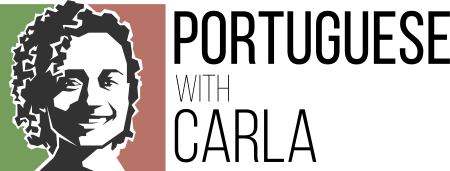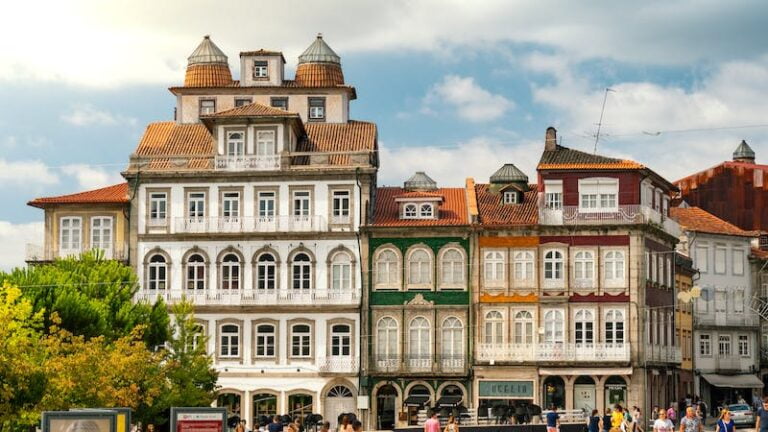Your First Words in Portuguese From Portugal
Do you want to start learning Portuguese? Then, this post is for you! Prepare yourself to explore the essential Portuguese phrases and words. These tools will allow you to kickstart your language-learning journey already one step ahead.
There are many reasons why you should learn Portuguese From Portugal. Learning a new language is exciting! It opens many possibilities for personal and professional development. But it is not always easy knowing where to start. And that is why we are here!
Below is a comprehensive list of common Portuguese words, phrases, and expressions. You can apply them to everyday life, from interacting with a store owner to navigating crowded streets or making a new friend in a café. These will be your first words in Portuguese from Portugal!
Basic Portuguese Words You Can Learn Today
Discover our interactive program – The Journey! It is a Portuguese course that teaches our beautiful native language while guiding you through an adventure.
Learn European Portuguese the Instinctive Way!
For the last decade, we’ve been working on putting together the best possible European Portuguese course. After much research, feedback from our students, and several iterations, we think we’ve got it! 😉
At the base of it all is a sound conviction that languages are better learned instinctively, so the process needs to engaging, varied, and enjoyable. Throughout, we used scientifically proven techniques to help you master pronunciation, phrase construction, oral understanding, grammar, and all the necessary bits to get you to fluency. And still, the whole thing is presented as an adventure. It’s a course like no other, trust us!
You will come to understand common words and basic Portuguese phrases. Furthermore, you will learn to speak Portuguese naturally and confidently.
Greetings and Polite Terms
Since the goal of learning a new language is communicating with other people, you can start by exploring basic greetings. After all, these are some of the most common Portuguese words and are the same for any Portuguese-speaking country.
Greetings
In European Portuguese, you can use a general greeting or adapt it to the time of the day. Even if you do not know anything else, greeting locals with these expressions can make a great impression on them. Using a simple Boa noite immediately makes you less of a tourist and more of a friend.
Here are some of the Portuguese words you can use to greet other people:
- Hello: Olá
- Good morning: Bom dia
- Good afternoon: Boa tarde
- Good evening or Good night: Boa noite
- Goodbye: Adeus (similar to the Spanish word Adios)
- Bye: Tchau (pronounced like the Italian word Ciao)
- See you later: Até logo
- See you soon: Até já
- How are you: Como está? or Como vai?
Polite Expressions
Besides greetings, polite terms help you maintain respect and conclude conversations on a good note. These are some of the Portuguese words and phrases you can use:
- Please: Por favor or Se faz favor
Por favor (Please) is also known as the magic word. It turns orders into requests and shows others you are respectful and thoughtful regarding their time and attention.
- Sorry: Desculpe
- Thank you: Obrigado or Obrigada
Obrigado/a (Thank you) and Desculpe (Sorry) are two critical words that show consideration toward others. These Portuguese words are crucial, so use them often. Discover whether you should use Obrigado or Obrigada in our YouTube video: How to say thank you in Portuguese – Obrigado or Obrigada?
- You are welcome: De nada.
Click to learn the alternative ways to say You are welcome in European Portuguese!
- I’m sorry: Peço desculpa.
- Excuse me: Com licença
Nevertheless, the Portuguese language is not all formalities and refinement. Would you like to learn the funny European Portuguese expressions? Check out our YouTube video: TOP 20 Funniest Portuguese Idiomatic Expressions!
Essential Vocabulary for Everyday Life Using The Portuguese Language
Vocabulary is a key to learning any language. It helps you build basic phrases to interact with Portuguese speakers. Here are some basic words related to various themes:
Food: Comida
- Bread: Pão
- Rice: Arroz
- Pasta: Massa
- Butter: Manteiga
- Olive oil: Azeite
- Oil: Óleo
- Fish: Peixe
- Carne: Meat
- Steak: Bife
- Ham: Fiambre
- Cheese: Queijo
- Cream: Natas
- Fruit: Fruta
- Vegetables: Vegetais or Legumes
Beverages: Bebidas
- Tea: Chá
- Vinho: Wine
- Milk: Leite
- Coffee: Café
- Lemonade: Limonada
- Beer: Cerveja
- Juice: Sumo
- Milkshake: Batido
- Water: Água
- Still water: Água sem gás
- Sparkling water: Água com gás
- Hot chocolate: Chocolate quente
If you visit Portugal in 2024, you will notice the difference between Portuguese coffee and what you find in other countries. Learn about it in our article: Portuguese Coffee – A Comprehensive Guide to Ordering in Portugal! Additionally, check out our YouTube video: All the Types of Coffee Served in Portugal.
Places: Lugares
- Country: País
- Street: Rua
- Road: Estrada
- City: Cidade
- House: Casa
- Bathroom: Casa de banho
- Bedroom: Quarto
- Kitchen: Cozinha
- Bakery: Padaria
- Restaurant: Restaurante
- Grocery store: Mercearia
- Market: Mercado
- Supermarket: Supermercado
- Shopping center: Centro Comercial
Means of Transport: Meios de Transporte
- Car: Carro
- Bike: Bicicleta
- Bus: Autocarro
- Bus Stop: Paragem do Autocarro
- Ticket: Bilhete
- Train: Comboio
- Train station: Estação do Comboio
Clothes: Roupas
- Shirt: Camisa
- Trousers: Calças
- Skirt: Saia
- Dress: Vestido
- Socks: Meias
- Coat: Casaco
- Hat: Chapéu
- Tie: Gravata
- Scarf: Lenço or Cachecol
The Numbers in Portuguese
From grocery shopping to telling the time, numbers are everywhere. So they should be among the first things you learn.
Cardinal Numbers: Números Cardinais
In European Portuguese, the cardinal numbers from 1 to 10 are:
- 1: Um
- 2: Dois
- 3: Três
- 4: Quatro
- 5: Cinco
- 6: Seis
- 7: Sete
- 8: Oito
- 9: Nove
- 10: Dez
You can learn the correct Portuguese pronunciation of the numbers in our video: Numbers 1-10 in European Portuguese.
Ordinal Numbers: Números Ordinais
The ordinal numbers from 1st to 10th in Portuguese are:
- 1st: Primeiro
- 2nd: Segundo
- 3rd: Terceiro
- 4th: Quarto
- 5th: Quinto
- 6th: Sexto
- 7th: Sétimo
- 8th: Oitavo
- 9th: Nono
- 10th: Décimo
Basic Portuguese Phrases For Travelers
Some phrases and expressions are essential to learn before traveling to Portugal. These sentences allow you to communicate with the natives using their mother tongue.
Thus, they will help you make friends among the locals and avoid tourist scams, improving your experience. Additionally, knowing these terms and phrases will also have a positive impact on you as a visitor. You will feel more comfortable and confident while exploring Portugal and its culture.
Asking Questions
As a visitor, you often need to ask for information and directions or practical help. Hence, you can formulate simple questions that allow people to provide you with one helpful phrase as an answer.
The question words in Portuguese are:
- Who: Quem (for people)
- What: O que (for things)
- Which: Qual
- When: Quando (for time)
- Where: Onde (for places)
- Why: Porquê (for reasons)
- How: Como (for more details)
If you want to know where the bathroom is, you will ask: Onde é a casa de banho? To ask for directions, you can say Como vou para (name of the place you want to go to)? (How do I go to…?)
These question words do not cover all the interrogations you might want or need to make. But you can adapt your queries to fit your knowledge of Portuguese. For example, to ask how much something costs, you can point at it and say: Quanto custa isso? But you can also use: Qual o preço? (What is the price?).
There are more valuable phrases and expressions tourists should know! Read our article: The 17 Best European Portuguese Phrases to Know if You’re Visiting Portugal in 2023 to find them!
Making New Friends and Acquaintances
If you want to start chatting with other people, you can say Olá or Bom dia. Then use a simple Como vai? and continue from there. Tudo bem? is another expression with the same meaning but a more informal tone. If the person asks you how you are, you can answer: Eu estou bem (I am well).
Introducing Yourself
Learning somebody’s name is easy. For that, you will say: Qual é o seu nome? or Como se chama?
Then, you can say Prazer em conhecê-lo/a (Nice to meet you). Finally, introduce yourself with O meu nome é followed by your name.

Would you like to learn conversational Portuguese from Portugal? Then, explore The Journey, our engaging course that helps you learn while having fun! It focuses on colloquial language and gives you the skills and confidence to speak like a native.
Answering Questions
Use Sim (Yes) and Não (No) to answer straightforward questions. If you feel confident, you can also employ an alternative way to say Não.
For more complex queries, you can elaborate simple phrases using what you know of Portuguese. If you have difficulty understanding a question or a Portuguese word, you can say: Eu não entendo bem Português. Pode repetir, por favor? (I do not understand Portuguese well. Can you repeat, please?)
To ask someone to speak slower use: Pode falar mais devagar, por favor? The first few times you establish a dialogue with a native, the language can seem like a frustrating barrier. But remember that, like anywhere else, Portuguese people will correspond if you stay polite and respectful. Soon, you will be chatting away fluently with more confidence than ever!
Continuing a Conversation
If you do not feel comfortable continuing a conversation in Portuguese, you can say Eu não falo Português (I do not speak Portuguese). Most native Portuguese speakers know English as a second language. Thus, you can ask Fala inglês? (Do you speak English?) and carry on without using the local language.
Contrarily, if you want to continue the conversation in Portuguese, let the other person know you are learning Portuguese. Say: Eu estou a aprender Português (I am learning Portuguese). Natives are usually kind and will be glad to help you practice their language.
English Words That Portuguese Natives Use
One of the benefits of globalization is that languages adopt words from each other. In this case, Portuguese has absorbed many words from English, and vice-versa. These terms have become generalized, and most native Portuguese speakers understand them. For example:
- Clothing items: T-shirt, Leggings, Blazer,
- Food and meals: Cheeseburger, Waffle, Bacon, Snack, Coffee break, Fast-food
- IT-related words: Wi-fi, Online, Log in, Internet, Site, Email
- Other words: Stress, Zoom, Ok, Nice, Hobby
Concluding on Your First European Portuguese Words
Basic Portuguese phrases and words are the building blocks that will set you up for fluency. Include these terms in your vocabulary notebook and keep it with you. This way, you will create a personal dictionary with the words and expressions you need to navigate Portugal.
Now that you know some of the most common Portuguese words, you can move on to acquire new knowledge. Start exploring more complex Portuguese phrases. And practice with a native Portuguese speaker to get effective real-time feedback.
Which is your favorite word in the Portuguese language? Let us know in the comment section below!
Are you excited to learn Portuguese From Portugal? Then, take one step further with these valuable contents:









